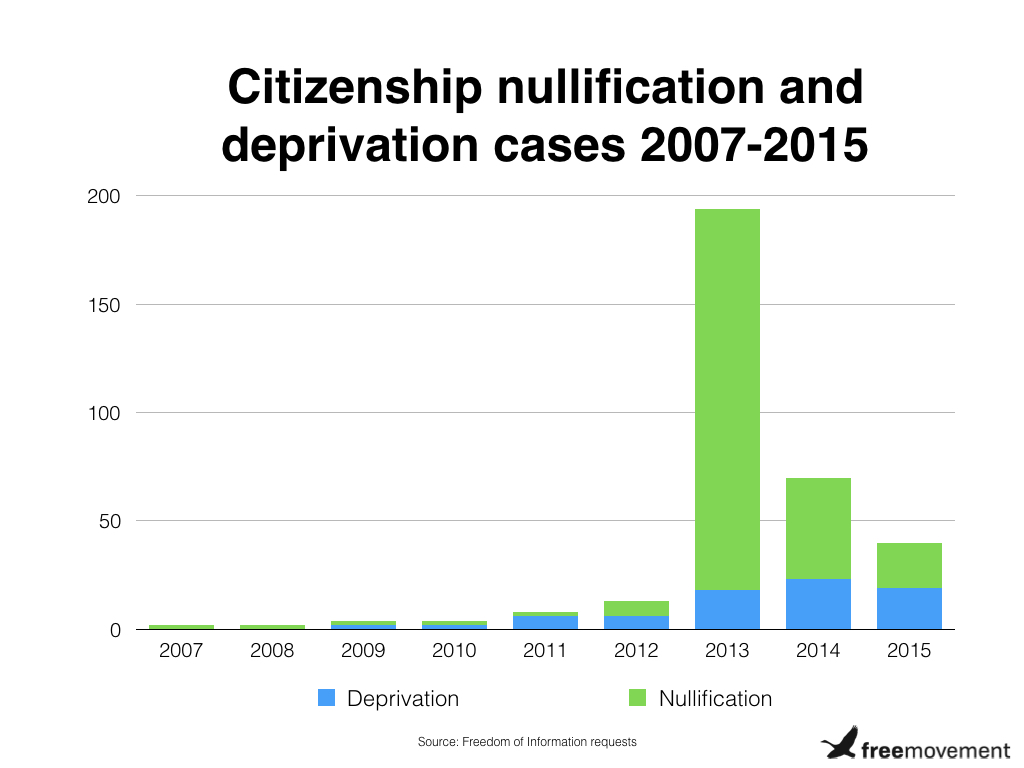- BY Colin Yeo

Home Office unlawfully nullifies British citizenship in hundreds of cases
THANKS FOR READING
Older content is locked

A great deal of time and effort goes into producing the information on Free Movement, become a member of Free Movement to get unlimited access to all articles, and much, much more
TAKE FREE MOVEMENT FURTHER
By becoming a member of Free Movement, you not only support the hard-work that goes into maintaining the website, but get access to premium features;
- Single login for personal use
- FREE downloads of Free Movement ebooks
- Access to all Free Movement blog content
- Access to all our online training materials
- Access to our busy forums
- Downloadable CPD certificates
New figures from the Home Office show that hundreds of British citizens have unlawfully had their citizenship nullified since 2013. A Freedom of Information request by the author revealed that there were 262 decisions to nullify British citizenship between 2007 and 2017, peaking at 176 cases in 2013. In December 2017, the Home Office conceded in a Supreme Court case that these nullification decisions were almost all unlawful.
A team of 11 civil servants in the Status Review Unit is now reviewing the historic decisions. A different legal process called deprivation of citizenship is likely to be used in at least some of the reviewed cases.

The chart shows the number of citizenship nullifications and deprivations up to the end of 2015. Nullifications were “fewer than 5” for 2016 and 2017, according to the Freedom of Information release but the number of deprivation cases in those years is not currently known.
Nullification of citizenship is an obscure common law declaration which is supposed to be used where one person impersonates another in order to pretend they are British. Where citizenship is nullified, the Home Office declares that the person was never British at all and any family members who have obtained British citizenship through them can also lose their status.
[ebook 57266]There have only been a handful of such cases reported in the past and it is unclear why the Home Office suddenly and dramatically increased the number of nullification actions.
In the Supreme Court case of Hysaj [2017] UKSC 82, in which judgment was given in December 2017, the Home Office conceded that it had unlawfully been nullifying citizenship in this way rather than using the correct procedure, which is a formal deprivation of citizenship. You can read our blog post about the case here: Supreme Court boost for people stripped of their British citizenship.
Deprivation of citizenship can only be carried out on limited grounds under the British Nationality Act 1981 and it carries a full right of appeal. Deprivation cases generally involve national security issues or deception leading to acquisition of citizenship, although some recent cases have involved serious criminality rather than national security issues, as we discuss in this long read blog post: The rise of modern banishment: deprivation and nullification of British citizenship.
The hundreds of nullification cases now under review are thought to have been based on deception as to the person’s identity, such use of an incorrect date of birth, nationality or name. Given that deception is one of the grounds for deprivation of citizenship, it is unclear why the Home Office chose nullification rather than deprivation. The explanation is likely to be one or more of these features of nullification compared to deprivation:
- Deception need not be directly linked to the acquisition of citizenship in nullification cases
- Nullification is less formal and therefore easier for civil servants to carry out
- Nullification has immediate and retrospective effect
- There is no right of appeal against nullification
Ultimately, nullification can be used in more cases than deprivation and a nullification decision is far harder to challenge than a deprivation one.
The cost of this bizarre and short-lived legal folly is unknown. Sometimes it seems government needs saving from itself. The High Court and Court of Appeal proved themselves unequal to this task: see Krasniqui [2010] EWHC 2405 (Admin), Kaziu [2014] EWHC 832 (Admin) and Hysaj [2015] EWCA Civ 854). The Hysaj judgment in the Court of Appeal was given by Lord Justice Sales prior to his elevation to the Supreme Court, but the Home Office itself was later to concede it was wrong.
SHARE

